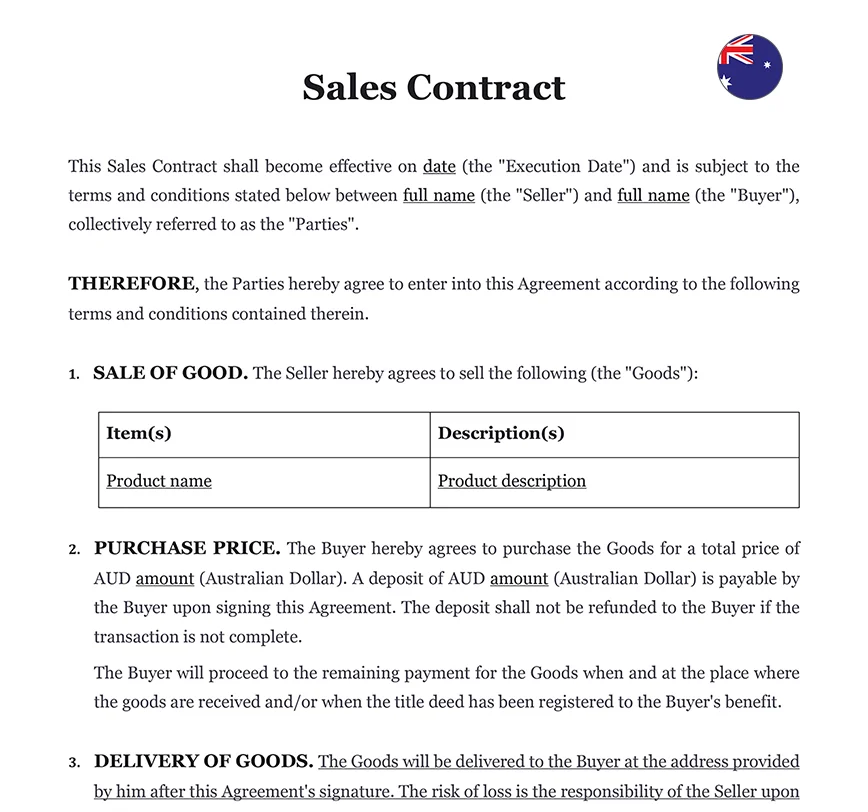Ready to use legal template
Drafted by experienced lawyers
Compliant with Australian law
Ready to use legal template
Drafted by lawyers
Compliant with Australian law
Home › Business contracts › Sales contract
Learn more about Sales Contract in Australia
A Sales Contract is a legal agreement between a seller and a buyer that outlines the terms and conditions of the sale of goods or services. It sets forth the obligations of both parties, including the price, delivery date, payment terms, and any warranties or guarantees. This document is essential in protecting the rights of both the buyer and the seller by ensuring clarity and reducing the risk of disputes. In Australia, a Sales Contract is critical for compliance with consumer protection laws and for maintaining proper business practices. Whether you’re selling goods or services, a well-drafted Sales Contract can help ensure a smooth transaction. Download our Sales Contract, easy to edit in Word format, expertly drafted to meet Australian legal requirements and provide clear, enforceable terms for your business dealings.
Table of contents
-
What legal requirements must be met for a Sales Contract to be enforceable in Australia?
-
How does a Sales Contract define the rights of buyers and sellers in Australia?
-
What key components should be included in a Sales contract?
-
Are there specific warranties that should be addressed in a Sales Contract in Australia?
-
How do Sales Contracts address issues in Australia?
-
Can parties negotiate the terms and conditions of a Sales Contract
-
What legal considerations should buyers and sellers keep in mind?
What legal requirements must be met for a Sales Contract to be enforceable in Australia?
For a Sales Contract to be enforceable in Australia, several legal requirements must be met to ensure its validity and enforceability. Firstly, the contract must be in writing and signed by both parties or their authorized representatives. Additionally, the Sales Contract must clearly identify the parties involved, describe the subject matter of the sale (such as the property or goods being sold), and specify the purchase price or consideration. The contract should also include essential terms and conditions of the sale, such as payment terms, delivery details, and any warranties or guarantees provided by the seller. Moreover, the Sales Contract must comply with any relevant statutory requirements and regulations governing the sale of the particular type of property or goods involved. Failure to meet these legal requirements may render the Sales Contract unenforceable or subject to challenge in court.
How does a Sales Contract define the rights of buyers and sellers in Australia?
A Sales Contract in Australia defines the rights and responsibilities of buyers and sellers involved in a sale transaction. Typically, the contract outlines the obligations of the seller, such as delivering the goods or property in accordance with the agreed-upon specifications, ensuring clear title and ownership rights, and providing warranties or guarantees as specified in the contract. On the other hand, the Sales Contract delineates the buyer’s obligations, including payment of the purchase price, acceptance of delivery, and compliance with any conditions or terms of the sale. Additionally, the contract may address other key issues such as inspection rights, dispute resolution mechanisms, and remedies for breaches of contract. By clearly defining the rights and responsibilities of both parties, the Sales Contract helps minimize misunderstandings, disputes, and legal issues that may arise during the transaction process.
What key components should be included in a Sales contract?
Several key components should be included in a Sales Contract to ensure compliance with Australian sales laws and regulations. Firstly, the contract should clearly identify the parties involved, including their names, addresses, and contact details. Additionally, the contract must accurately describe the subject matter of the sale, such as the property or goods being sold, including any relevant specifications or characteristics. The Sales Contract should specify the purchase price or consideration, payment terms, and any applicable taxes or fees. Moreover, the contract should outline the terms and conditions of the sale, including delivery arrangements, risk of loss, inspection rights, and any warranties or guarantees provided by the seller. Furthermore, the Sales Contract should include provisions regarding dispute resolution mechanisms, termination rights, and any other relevant terms necessary to complete the transaction. By including these key components, the Sales Contract ensures that all parties understand their rights and obligations, and the transaction proceeds smoothly and in accordance with the law.
Are there specific warranties that should be addressed in a Sales Contract in Australia?
In a Sales Contract in Australia, specific warranties or guarantees may be addressed depending on the nature of the sale transaction and the applicable legal requirements. Common warranties or guarantees that may be included in a Sales Contract include:
1. Title Warranty:
The seller warrants that they have clear and marketable title to the property or goods being sold and have the right to transfer ownership to the buyer free from any encumbrances or defects.
2. Quality or Fitness for Purpose Warranty:
The seller guarantees that the property or goods being sold are of merchantable quality, fit for their intended purpose, and free from defects or deficiencies that would render them unfit for ordinary use.
3. Non-Infringement Warranty:
The seller warrants that the sale and use of the property or goods do not infringe upon any third-party intellectual property rights, patents, trademarks, or copyrights.
These warranties or guarantees provide assurances to the buyer regarding the quality, condition, and legal status of the property or goods being sold, and may vary depending on the nature of the transaction and the bargaining power of the parties involved.
How do Sales Contracts address issues in Australia?
Sales Contracts in Australia address various issues related to delivery, payment terms, and risk of loss to ensure that the transaction proceeds smoothly and in accordance with the parties’ intentions. Firstly, the contract specifies the agreed-upon delivery arrangements, including the method of delivery, the place of delivery, and the timeframe for delivery. Additionally, the Sales Contract outlines the payment terms, including the purchase price, any deposit or down payment required, and the schedule for payment of the remaining balance. The contract may also specify the currency and mode of payment accepted by the seller, such as cash, check, bank transfer, or electronic payment. Furthermore, the Sales Contract allocates the risk of loss between the buyer and seller, determining when the risk passes from the seller to the buyer. Typically, the contract specifies that the risk of loss transfers to the buyer upon delivery or another agreed-upon milestone, such as payment or possession. By addressing these issues in the Sales Contract, parties can clarify their respective obligations and minimize the risk of disputes or misunderstandings during the transaction process.
Can parties negotiate the terms and conditions of a Sales Contract
Yes, parties to a Sales Contract in Australia can negotiate the terms and conditions of the contract to suit their specific needs and preferences. The negotiation process allows buyers and sellers to discuss and agree upon various aspects of the sale transaction, including the purchase price, payment terms, delivery arrangements, warranties or guarantees, and any other relevant terms. Parties may negotiate amendments or modifications to the standard terms and conditions of the contract to reflect their unique requirements or address specific concerns. For example, buyers may negotiate for a lower purchase price, extended payment terms, or additional warranties or guarantees from the seller, while sellers may seek to limit their liability, impose conditions precedent, or include indemnification provisions. However, it’s essential to note that negotiations must be conducted in good faith, and any changes to the contract must be mutually agreed upon by all parties involved. Additionally, parties should carefully consider the legal implications of proposed amendments and seek legal advice if necessary to ensure that the contract remains enforceable and complies with applicable laws and regulations.
What legal considerations should buyers and sellers keep in mind?
When entering into a Sales Contract in Australia, buyers and sellers should consider several legal considerations to protect their interests and ensure a successful transaction. Firstly, parties should carefully review the terms and conditions of the contract to ensure that they understand their rights and obligations fully. It’s essential to seek legal advice if necessary to clarify any ambiguous provisions or address any concerns before signing the contract. Additionally, parties should conduct due diligence on the property or goods being sold, including inspections, searches, and inquiries, to verify their condition, ownership, and legal status. Moreover, buyers and sellers should be aware of their rights and remedies in case of breach of contract, default, or disputes, including termination rights, damages, and specific performance remedies. Furthermore, parties should consider the potential tax implications of the sale transaction and consult with tax advisors or accountants to assess their tax liabilities and obligations. By carefully considering these legal considerations, buyers and sellers can mitigate risks, protect their interests, and ensure a smooth and successful sale transaction.
SPECIAL OFFER
Startup
15 Document Package
Essential documents for running your business in Australia
Share information
Why Themis Partner ?
Make documents forhundreds of purposes
Hundreds of documents
Instant access to our entire library of documents for Australia.
24/7 legal support
Free legal advice from our network of qualified lawyers.
Easily customized
Editable Word documents, unlimited revisions and copies.
Legal and Reliable
Documents written by lawyers that you can use with confidence.




